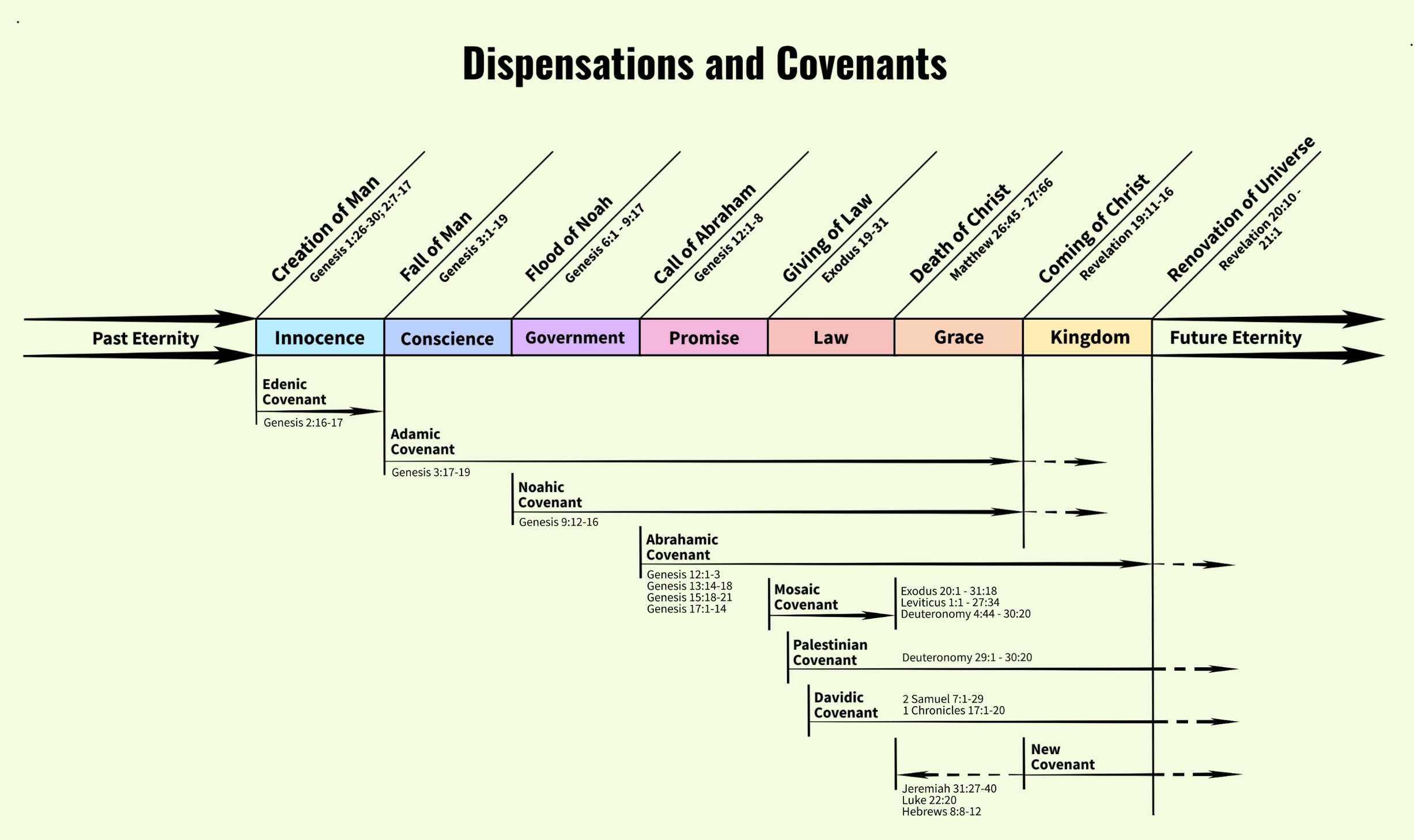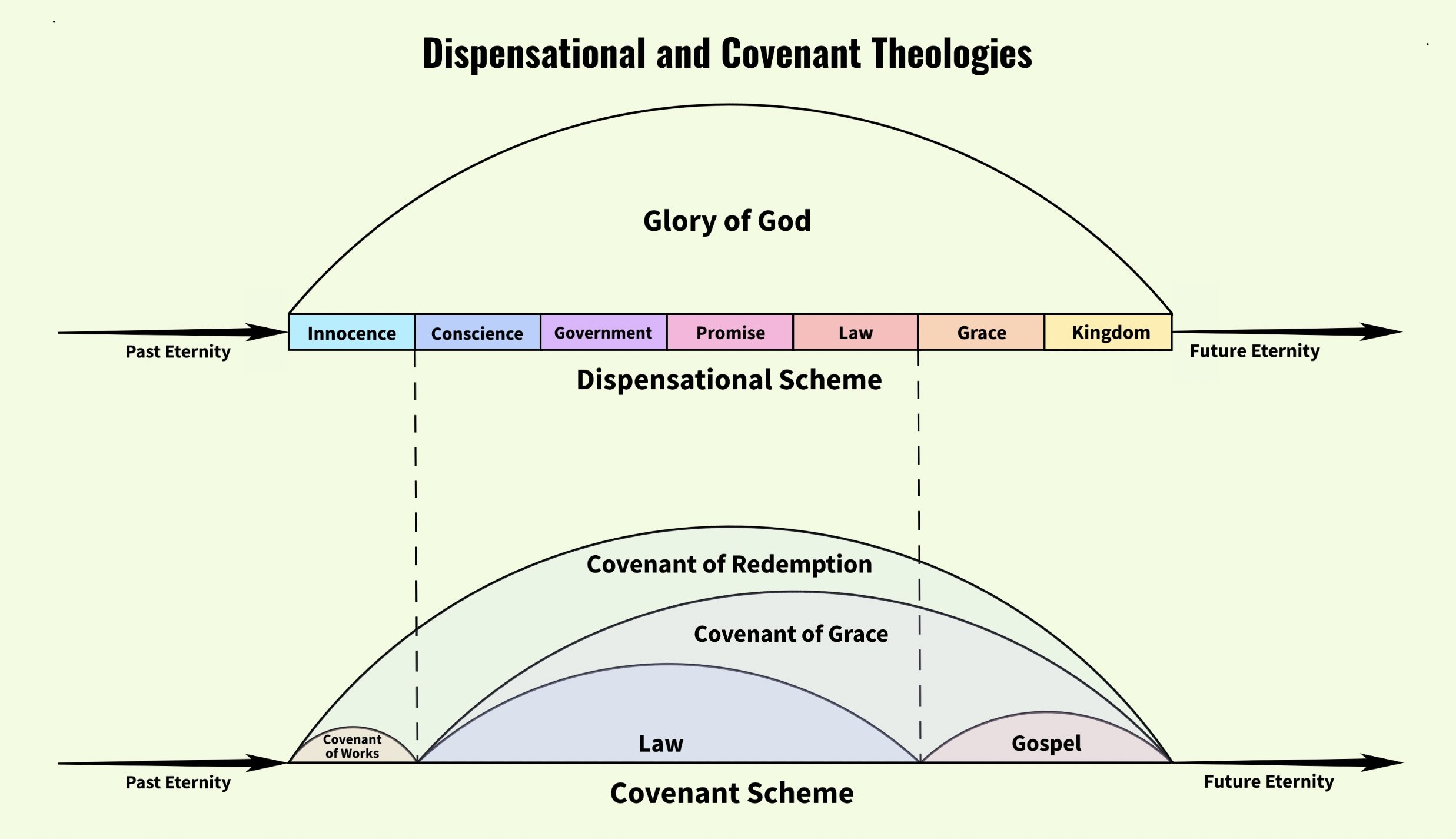Principle 18
HERMENEUTICS
PRINCIPLE 18
Comprehend the Biblical Covenants
This principle goes hand in hand with the principle of recognizing the fact of “Progressive Revelation.” The diagram below compares the “dispensations” and the biblical covenants. A covenant is a formal, solemn, and binding agreement made by God with mankind.
Notice that the biblical covenants are not the same as the dispensations, and the covenants are not always confined to a single dispensation. The Edenic Covenant, the covenant God made with Adam in the Garden of Eden, was confined to the “dispensation of Innocence.” The Mosaic Covenant was confined to the “Dispensation of Law,” but the other biblical covenants carry on through several dispensations. Some are still in effect today. We need to be able to distinguish between the dispensations and the biblical covenants.
The biblical covenants are either “conditional” or “unconditional.” Conditional covenants (such as the Edenic Covenant and the Mosaic Covenant) depended on human obedience, and were limited in time. Unconditional covenants (such as the Abrahamic Covenant and the Davidic Covenant) continue on throughout time until their complete fulfillment. They depend on God’s faithfulness - not on human obedience. However, the full blessings of unconditional covenants may be temporarily withheld because of man’s unbelief and disobedience.
Comprehending these biblical covenants will affect our interpretation of Scripture. Before we look into these biblical covenants we need to briefly distinguish between “biblical covenants” and “Covenant theology.”
The diagram below compares Covenant theology and Dispensational theologies. In the dispensational theology diagram, we see the different dispensations unified under the over-arching theme of the “glory of God.” In the diagram of Covenant theology, a “covenant of redemption” is the over-arching theme. Covenant theologians believe this covenant was made in Eternity Past, and was then worked out in time: first in the covenant of works in the Garden of Eden, and then in the covenant of grace, which is in effect now.
Which of these theologies is more biblically accurate? Covenant theologians accuse dispensationalists of “fracturing” the Bible. Dispensationalists would say that Scripture can be shown to demonstrate the division between certain dispensations. In addition, the “covenant of grace” cannot be shown to have been made after the fall. Certainly God has shown grace since that time, but a specific “covenant” of grace overlooks the distinction between the dispensations and can lead to serious interpretational problems.
By failing to recognize the different dispensations, Covenant theology loses the distinction between Israel and the Church. It sees only one “people of God” throughout history. Covenant theologians “spiritualize” the Old Testament promises and prophecies that God made to Israel - “spiritualizing” them, and applying them “spiritually” to the Church (which they call the “New Israel”). There is no rapture of believers, and no literal future reign of Christ on earth. We’ll discuss these concepts in more detail in Principles 19 and 20. For now, recognize that the “theological system” you hold is important, because it greatly affects your interpretation of certain Scriptures.
Dispensationalists recognize the biblical covenants listed in the diagram. Proper interpretation of Scripture is often affected by the proper recognition and understanding of these covenants, so it’s important to study these charts.
Throughout human history, God has made covenants, or contracts, with mankind. Beginning with the Edenic Covenant before the Fall, God proceeded to guide the human race with the Adamic Covenant after the Fall, and the Noahic Covenant after the great Flood. The Abrahamic Covenant, the Mosaic Covenant, and the Davidic Covenant were all specifically made with the Jewish people. Finally, God will bring in the New Covenant with Israel, which is based on the death of Christ.
In order to apply each biblical covenant correctly, it’s very important to know whether the covenant was made with the entire human race or only with a select group of people. It’s also extremely important to know whether the covenant was to be permanent and unconditional — or whether it was limited in time — because certain conditions were placed upon the people involved. Comprehending the biblical covenants is important for proper interpretation, so let’s consider a few examples.
Leviticus 19:18-19
Leviticus contains many laws that were given to distinguish the practices of God’s people from the pagan practices of the surrounding nations. As Christians, we believe it’s not necessary for us to keep laws about cattle, seed, and cloth, as seen in Leviticus 19:19. Why not? Because they were part of the “Mosaic Covenant” - the covenant God made through Moses with the people of Israel
The Mosaic Covenant was a limited covenant, made by God with the Jewish people before the coming of Christ. The Mosaic Covenant was limited to Old Testament times. It was a conditional covenant, because it was dependent on Israel’s obedience. Deuteronomy 28:1 introduces the covenant benefits in this contract between God and Israel. It begins by saying, “IF you diligently obey…” Because the nation of Israel didn’t obey, the covenant was set aside when Christ came (see Romans 10:4).
The civil regulations of Leviticus 19:19 about cattle, crops, and clothing were part of the Mosaic Covenant, so they’re not binding for Christians today. On the other hand, Leviticus 19:18 contains God’s moral law to love your neighbor as yourself. God’s moral law is just as binding now as when it was given in the Mosaic Covenant. As Christians today, we should feel guilty if we wrong our neighbors - but we don’t have to feel guilty for wearing a shirt made of a blend of fabrics!
This doesn’t mean we can pick and choose which biblical laws we want to obey, and forget about the rest. Leviticus 19:18 is a moral law of God, and God has never terminated or changed any of the moral standards or principles contained in the Mosaic covenant. God’s moral standards never change! In fact, the moral laws of the Mosaic covenant can all be found in the New Testament under the law of Christ.
However, the civil and ceremonial aspects of the Mosaic Covenant ended with Christ. We must always distinguish between God’s moral laws, based on eternal principles, and the civil and ceremonial laws associated with conditional covenants. This is all part of properly comprehending the biblical covenants.
Capital Punishment
Understanding the biblical covenants can actually give us insight into the difficult issue of capital punishment. The fact that the death penalty was a civil law under the Mosaic Covenant is one of the arguments used by Christians who are against capital punishment. As a nation, Israel had the responsibility to maintain civil law and order, and capital punishment was part of that responsibility. But we said earlier that the civil requirements of the Mosaic Covenant have ended, so is there still a biblical basis for capital punishment? It could be argued that the civil law of capital punishment was to enforce the moral law of “Do not murder,” and therefore it still applies today, even though the Mosaic Covenant has ended.
However, this reasoning presents a serious problem to those capital punishment advocates who would use the Mosaic Law as a basis for the death penalty. Under the Mosaic Covenant the death penalty was to be carried out for more than just the crime of murder. Adultery, incest, homosexuality, bestiality, witchcraft, and idolatry were also punishable by death (see Leviticus 20). Even a rebellious teenager who would not submit to the authority of his parents was to be put to death (Deuteronomy 21:18-21)! Although some might favor the death penalty for some of these additional offenses, most Christians would limit capital punishment to the crime of murder.
Is it inconsistent to support the death penalty only for the crime of murder? No, because the biblical basis for capital punishment is not the Mosaic Covenant!
The original biblical basis for capital punishment is found in the covenant God made with Noah after the Flood (Genesis 9). The “Noahic Covenant” was not limited to the nation of Israel, because Israel did not even exist at that time. God made the Noahic Covenant with the descendants of Noah (Genesis 9:9). This covenant, therefore, includes all mankind. Furthermore, the Noahic Covenant was not conditional, nor was it limited in time. Genesis 9:12 says it was given for all generations to come. The sign of the Noahic Covenant was, and still is, the rainbow (Genesis 9:13). As long as there are rainbows in the sky, the Noahic Covenant is still in effect (Genesis 9:14-17).
One of the stipulations of the Noahic Covenant was capital punishment. In Genesis 9:6 God decreed that death was the penalty for the crime of murder (but not for all the other sins listed in the Mosaic Covenant). God’s reason was that He made humans “in God’s image.” Capital punishment was instituted because God places a very high value on human life. In fact, God considers human life to be so valuable that He decreed that those who take human life must suffer the ultimate punishment, the death penalty. So a Christian who would abolish capital punishment not only exhibits an ignorance of biblical covenants, but actually takes a lower view of the value of human life than does God Himself.
The basis for capital punishment was not removed by Christ at the coming of New Testament times. In fact, a sovereign government’s authority to use the “sword” to maintain law and order is confirmed in Romans 13:1-7. When the Holy Spirit inspired Paul to write this Scripture, the Roman Empire (with Nero on the throne) was not a godly government, by any stretch of the imagination! The historical background of Romans 13:1-7 eliminates the argument that America is too ungodly to practice capital punishment. The Noahic Covenant establishes the right and responsibility of every sovereign nation to use capital punishment as the penalty for murder, and Romans 13 confirms it. So, you can see that a good understanding of the biblical covenants is necessary to identify the biblical basis for capital punishment today.
Tithing
Comprehending the biblical covenants can also help with another controversial topic: tithing. The word tithe means 10%. When we tithe, we give 10% of our income to God. Many Christians tithe on the basis of the Old Testament laws in the Mosaic Covenant. This is not a sound hermeneutical basis for tithing, since the Mosaic Covenant ended with Christ. On the other hand, some Christians excuse themselves from tithing saying that, since the Mosaic Law ended with the death of Christ, we are no longer obligated to tithe. These believers are not properly interpreting Scripture either!
Tithing appears in Scripture before the Mosaic Covenant was established. In Genesis 14, Abraham gave tithes to Melchizedek, the king/priest of Salem. This took place long before the Mosaic Covenant was made. Thus, tithing is a biblical principle.
We see it again in Genesis 28, when Jacob made a vow to give a tenth of his income to God after his dream at Bethel. Giving a tenth of your income to God is a biblical practice that was established before the Mosaic Covenant. Tithing is a biblical principle.
It is true that tithing is not mentioned in the “giving” passages of the New Testament, such as 2 Corinthians 8-9, but if Christians follow New Testament patterns of giving, they will be giving at least 10% of their gross income to God! Therefore, while we’re not to be legalistic about tithing, if we are giving biblically, we will at least be tithing!
This lesson has addressed some broad and, perhaps, difficult principles. Pray about any difficulties you may be having. Ask God for wisdom in understanding these truths so you can apply them to better understand and interpret His Word.

